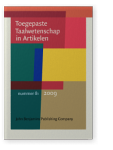Vol. 81 (2009) ► pp.31–40
Effect of Learning a New Language on Children's Willingness to Communicate
The present study was set up to evaluate to what extent multilingual study groups can be considered homogeneous. A series of interviews were conducted to investigate the metacommunicative awareness of 101 children. We compared children who had learned an additional language in a formal context (abbreviated LLE, i.e. Language Learning Experience) to those who had not (abbreviated nLLE, i.e. without a Language Learning Experience). The primary outcome measure consisted of the reactions to an imaginary situation of communication. The results of the current study suggest that LLE children were more inclined to carry out the exchange than the nLLE children. Studying the same outcome measure, no such difference was identified when comparing monolingual to multilingual children. These findings indicate that with regard to the present tasks, the presence or absence of LLE may be a more relevant factor than mono- or multilingualism.
Article language: Dutch
Cited by (3)
Cited by 3 other publications
This list is based on CrossRef data as of 21 july 2024. Please note that it may not be complete. Sources presented here have been supplied by the respective publishers. Any errors therein should be reported to them.
